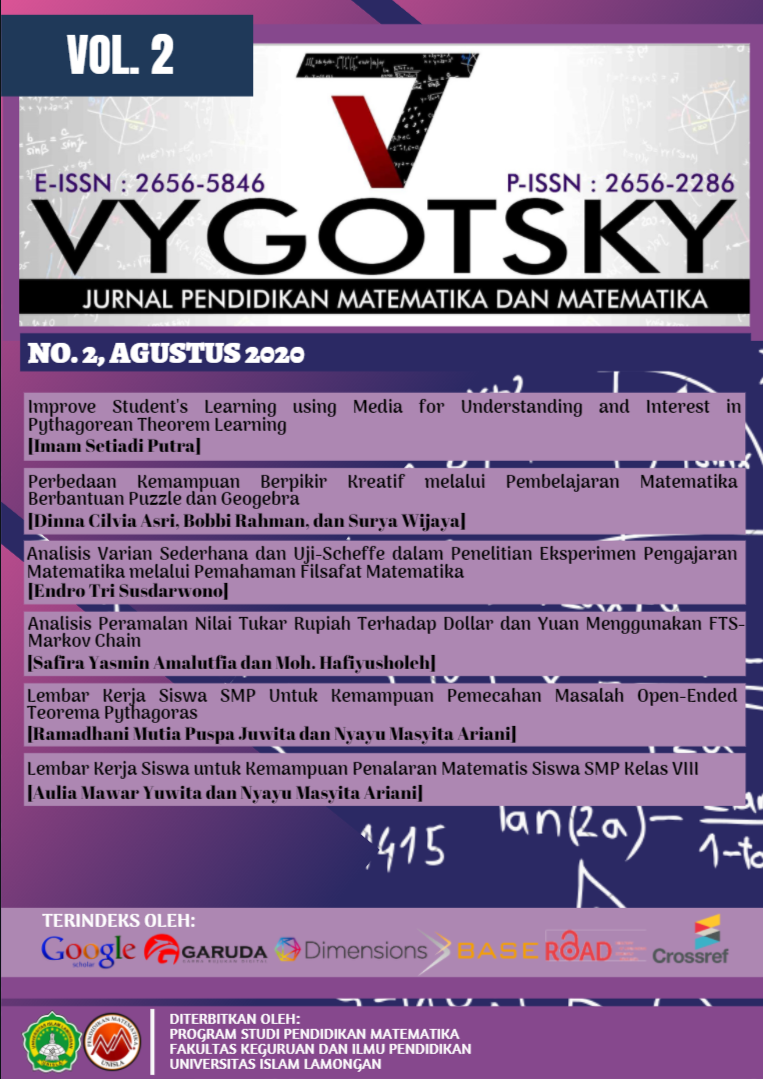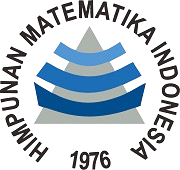Improve Student's Learning Using Media for Understanding and Interest in Pythagorean Theorem Learning
DOI:
https://doi.org/10.30736/vj.v2i2.222Keywords:
Media of learning, Understanding, Interest in Learning, Pythgorians TheoremAbstract
This study focuses on the use of mathematics learning media in improving the students' defense and interest in learning pythagoras theorem. Research subjects taken in one school in Bima City West Nusa Tenggara Indonesia. Research sample were taken randomly/ randomly to follow the learning by using manipulative media. Learning media designed in the study there are two, namely ICT and Non ICT media. ICT media contains about instructional materials, quiz, video and educative games, while in non ICT media bearing on the proof of pythagoras theorem. The results of this study indicate that the use of learning media can improve students' understanding and interest in learning mathematics, it is shown by an increase in the average result of questionnaire interest in learning mathematics students from before the process of learning using media that is equal to 60.27 with after using media-based ie amounted to 87.07. In addition, the results of this study indicate that there is influence of the use of learning media to improve students' understanding on learning pythagoras theorem.
Downloads
References
Bamby, (2017). How can Asses Mathematical Understanding. Proceedings of the 3ist Confference of the International Group for the Psychology of the Mathematics Education. PP. 41-48. Seoul: PME.
Chen, C.P,Wu, C.F,. & Liu, Y.T,. (2015). Research On Integrating Multimedia And E-Learning Platform To The Remedy Teaching Of Mathematic For Learning Achievements. International Research Journal of Engineering and Technology (IRJET). 02 (09).2395 -0056
Garegae, K. G. A. (2012). Question for Understanding in Mathematics Learning: Examining Theories of Learning. University of Botswana.
Holzinger, A. (2016). Multi Media Elearning Software Triangle Case-Study: Experimental Results And Lessons Learned. J. of Universal Science and Technology of Learning. 0(0) 61-92
Muhibbin Syah (2010). Psychology of Learning, Jakarta: PT Raja Grafindo Persada
Nugraha dan Rusmin (2015). Educational Game Design onm Pythagorean Theorem For Game Based Learning Using 6i’s Component. 4th International Conference on Interactive Digital Media (ICIDM).DOI:10.1109/IDM.2015.7516330
Ragnhild J. R. 2014. The Impact of Lecture Notes on An Engineering Student’s Understanding of Mathematical Concepts. Journal of Mathematical Behavior 34. 33–57
Safari, 2003 dalam .digilib.ump.ac.id/download.php?id=2612 pada https://www.google.com/search?q=indikator%20minat%20belajar&gws_rd=ssl Diakses pada 04/01/2019
Slameto. (2013) Learning and Factors That Affect It. Jakarta: Rineka Cipta
Sugiyono. (2011). Quantitative, Qualitative, and R&D Research Methods, Bandung: Alfabeta
Suharsimi Arikunto (2010). Research Procedure A Practical Approach, Jakarta: Rineka Cipta
Sutton, K. (2012). A Study Of Students' Misconceptions Regarding Variables In The Pythagorean Theorem And Slope/Intercept Formula. Department of Mathematical Sciences State University of New York at Fredonia. Fredonia New York
Usman, F. A &, Ekasatya, A. A. 2017. Kemampuan Pemahaman Matematis Siswa Melalui Model Pembelajaran Auditory Intellectualy Repetition Dan Problem Based Learning Jurnal Pendidikan Matematika, 11(1),68-78
Downloads
Published
How to Cite
Issue
Section
License
Copyright:
Authors who publish their manuscripts in this Journal agree to the following conditions:
- Copyright of any article on Vygotsky: Jurnal Pendidikan Matematika dan Matematika is held solely by the author under the Creative Commons Attribution 4.0 International license (CC BY NC SA).
- Authors can submit papers separately, arrange non-exclusive distribution of manuscripts that have been published in this journal into other versions (e.g. sending to the author's institutional repository, publication in a book, etc.) by acknowledging that the manuscript has been published for the first time in Vygotsky: Jurnal Pendidikan Matematika dan Matematika.
License:
Vygotsky: Jurnal Pendidikan Matematika dan Matematika is published under the terms of the Creative Commons Attribution 4.0 International License (CC BY NC SA). This license permits anyone to copy and redistribute this material in any form or format, compile, modify and develop this material for any purpose as long as it is not for commercial purposes. Additionally, anyone must provide credit and distribute contributions under the license of the creator of the original work.







